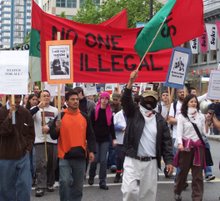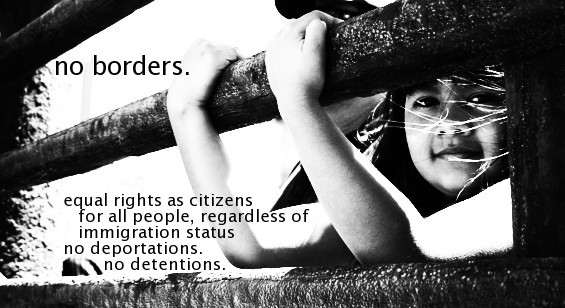Canada's foreign policy and Afghanistan
Canada is fighting a counternarcotics campaign and a counterinsurgency in Afghanistan. Afghanistan currently supplies 90 per cent of the world's heroin. The narcotics Canada is fighting are a product of the occupation. They are a product of the alliances the Afghan government has made with the warlords who actually control the country. They are a product of the falsehood that Canada or the US is interested in 'development' in Afghanistan. They are a product of fact that the only hope a farmer has of earning a livelihood is through this crop that can bring a little cash (not a lot of cash, because no peasant ever gets rich from growing poppy in Afghanistan).
The Taliban, who ruled the country before the US and Canadian occupation, had banned the poppy. That's not praise for the Taliban - they also banned music, sports, television, and laughter. That isn't the solution to the problem either – it can't be a solution to the livelihood of 2.3 million people, the 10% of the Afghan population, who rely on the poppy. Solutions to drug problems are clear enough and well enough known – treatment for addiction, legalization and control, education and support for the agrarian economy. But the drug war is a useful pretext for other agendas. As for the counterinsurgency, the question of how Canada came to be involved in it is important. It is part of an evolution in Canadian foreign policy in recent years.
(Click here to read more)
skip to main |
skip to sidebar







Vancouver - Occupied Coast Salish Territories noii-van@resist.ca / 604-682-3269 ext.7149 www.nooneisillegal.org

Blog Archive
-
▼
2007
(422)
-
▼
January
(139)
- Gitmo North Hunger Strike Update: "We are slowly d...
- Dumas family sues Winnipeg police for wrongful death
- Cottagers forced to leave after land returned to O...
- Quebec town to immigrants: you can't kill women
- CIEPAC denounces harrassment and surveillance
- Ottawa, Six Nations outline positions
- No Border Camp 2007 Zine / Fan-zine de Campamento ...
- Anti-gay, anti-trans Inquisition in the Americas
- The Triquis Inaugurate Their New Autonomous Munici...
- The Flexibilities Of TRIPS and the Indian Left
- Sign to Support: CCIODH Preliminary Conclusions an...
- US: 761 Arrested in Immigration Sweep
- Deportation boats blockaded in Netherlands
- 3.7 Million Iraqi Refugees from US Occupation
- The Iraqi Debacle
- NYC: Scanners for Tracking City Workers
- Amnesty International's Track Record in Haiti
- Jewish Like Me
- Conflict, Disagreement & Oppression on the Left
- Carter and Camp David, where it all began
- Palestinian refugees must have a say-so
- Canada: Hauntings of Colonialism
- AFL-CIO and National Endowment for Democracy
- UK deportations to Iraq/Kurdistan
- US Terror Trials to Allow Hearsay
- The War Becomes More Unholy
- Starving Afghans sell girls of eight as brides
- Open Letter From Concerned Academics
- National Immigrant Solidarity Network Open letter ...
- Bush Blinks on Illegal Spying
- Fighting for the Future of Afghanistan
- Shut Down Guantanamo North and South!
- U.S. Offers Scant Help to Iraqi Refugees
- America’s Slave Labor: Inmates Are Being Forced to...
- The Ciudad Juarez Declaration and the New Wave of ...
- 9,000-year-old Artifacts Found on Occupied Land in...
- U.S. urges 'fivefold expansion' in Alberta oilsand...
- State of Emergency in Bangladesh
- El Salvador's migrants
- Lebanon on the Brink
- 34,000 Iraqi Civilian Deaths In 2006
- Steady March to War on Iran
- Canada: $430M announced for border security
- Demonstration links plight of Palestinians to Nati...
- Colombia: Murder and Migration
- Tyendinaga Update: The Fight for Return of Culbers...
- New Orleans: Letter from St. Bernard Occupation
- Apocalypto: The Cinematic Logic of Genocide
- Bangladeshi President Postpones Election And Impos...
- A current Gitmo detainee speaks
- I Will Not Sign the Darfur Peace Negotiations
- Democracy and Plan Colombia
- Separate and Unequal: The History of Arab Labour
- Bush's Iraq Plan - Goading Iran into War
- Feminist organizations protest attacks on Status o...
- Russia's Racist Crackdown on Immigrants
- Iraq Refugees: Largest Movement Since Palestine 1948
- Anti-torture Conference Denounces U.S., Zionist, T...
- Canadian Prison Guards to Test Stun Guns
- Pittsburgh Organizing Group Shuts Down Recruitment...
- Iraq War and America's Economic Imperialism
- On Zapatista Encuentro
- Aghanistan/Pakistan: Fencing Across The Border
- Roots of US-Made Somalia/Ethiopia War
- Bush 'declaration of war' on Iran
- Iraq Set to Hand Over Oil Reserves to US Energy Gi...
- Protection Racket for Big Pharma
- US Air Strikes on Somalia
- Widening American Rich-Poor Income Gap
- Indigenous Peoples Resist Border Task Force
- Iran: Bloggers Rebel at Censorship
- US Teen Abstinence-Only Crusade
- Recent Elections in Latin America
- Israel: Conditional Citizenship
- Profits of Iraq War Escalation
- Genocide in Gaza, Ethnic Cleansing in the West Bank
- Detainees Release Open Letter from Gitmo North
- Mohawk protest against Deseronto quarry
- New French law enshrining right to housing
- Raids, Reforms, and the Labor Movement
- On the Zapatista Encounter
- Movements in Orissa Face Political Repression
- Guantanamo Bay: A Dark Anniversary
- On Guantanamo Prison Camp's Fifth Birthday, New Pr...
- Open letter by Moroccan, African and European asso...
- Peltier: When the Truth Doesn't Matter
- Black Power, Racism and COINTELPRO: Justice for th...
- Somalia: Making of Another Iraq
- Democrats Criticize Iraq “Surge”,But Won’t Cut War...
- US launches air raids in Somalia
- Make Borders History: Antiracist Perspectives to F...
- Nepal’s gays hit by Maoist clean up drive
- How the West will profit from Iraq's oil
- New York Times pushing War on Iraq
- Inside Gitmo North
- Pakistan: Dissent is Alive
- South America: Toward an alternative future
- Canada in Afghanistan
- Israeli troops raid Nablus
- Demands of the women of Oaxaca
-
▼
January
(139)
Labels
- Afghanistan (21)
- Africa (25)
- Anti-Oppression (15)
- Australia (8)
- Canada (105)
- Corporate Globalization (45)
- East Asia (9)
- Environment and Health (26)
- Europe (25)
- Gender (42)
- GLBTQ (7)
- Haiti (9)
- Immigrant/Refugee/Nonstatus (154)
- Imperialism (51)
- Incarceration (63)
- Indigenous (57)
- Iraq (54)
- Labour (34)
- Latin America (41)
- Media (3)
- Middle East (28)
- Palestine (42)
- Police Brutality (4)
- Poverty (17)
- Racism (58)
- Security (67)
- Somalia (7)
- South Asia (25)
- SPP (2)
- US Abroad (91)
- US Home (160)

About Us
No One is Illegal-Vancouver is a grassroots anti-colonial immigrant/refugee rights community collective with leadership from members of migrant and/or racialized backgrounds.
As a movement for self-determination that challenges the ideology of immigration controls, we are in full confrontation with Canadian border policies; denouncing and taking action to combat racial profiling, detention and deportation, the national security apparatus, law enforcement brutality, and exploitative working conditions of migrants. We stand in solidarity with indigenous struggles against colonization across Turtle Island and also place ourselves within the broader movement for global justice struggling against capitalism, homophobia, occupation, patriarchy, poverty, war, and other systems of oppression and exploitation.





No One Is Illegal - Vancouver
Our educational work involves furthering an anti-imperialist, anti-war, and anticapitalist analysis that links the "War on Terror" abroad to the racist "Fortress North America" at home. We struggle for the right for our communities to maintain their livelihoods and resist war, occupation, and displacement, while building alliances and supporting indigenous sisters and brothers fighting theft of land and displacement.
Our work is carried out through various strategies including public awareness events, direct support work with refugees and undocumented migrants, multilingual community political/legal forums, fighting back through rallies and direct actions, and ongoing campaigns and projects.